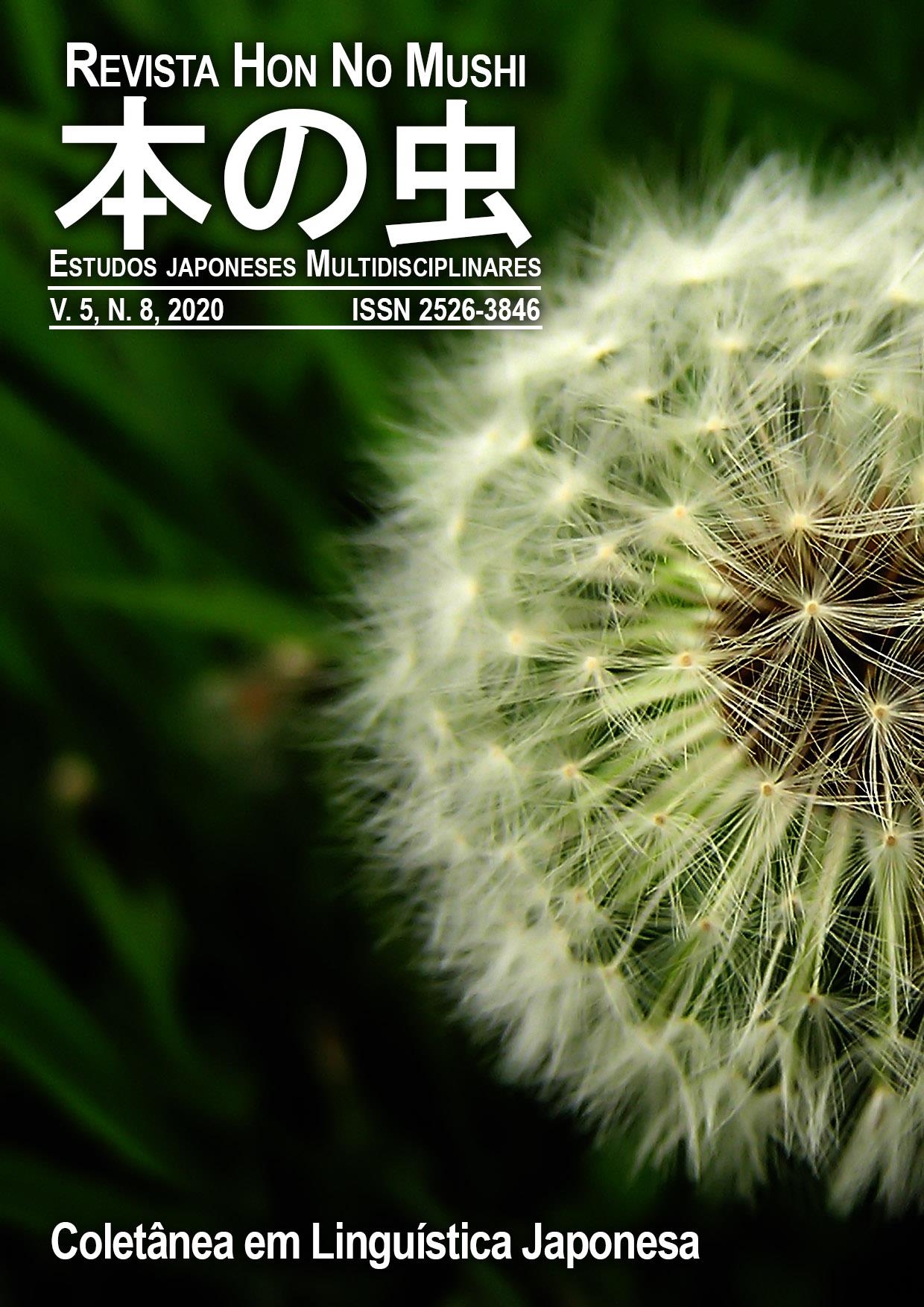CLASSES ADJETIVAIS NO NORDESTE ASIÁTICO
REVENDO AS LÍNGUAS JAPONESA E COREANA
##semicolon##
Classes Adjetivais##common.commaListSeparator## Língua Coreana##common.commaListSeparator## Língua Japonesa##common.commaListSeparator## Nordeste Asiático##common.commaListSeparator## Adjetivos要旨
Descrições de línguas do nordeste asiático frequentemente precisam lidar com a questão do reconhecimento ou não de uma classe adjetival em seu sistema lexical. Essa discussão tem estado presente nos estudos de línguas da região como Ainu (REFSING, 1986; SHIBATANI, 1990), falado no norte do Japão; Coreano (CHANG, 1996; SOHN, 2004; SOHN, 1999; YEON e BROWN, 2011), falado na península coreana; e Nivkhe (NEDJALKOV e OTAINA, 2013; GRUZDEVA, 1998; MATTISSEN, 2003), falado ao norte do Japão. No Brasil, essa mesma discussão tem estado presente na área de estudos japoneses devido a descrições como a de Suzuki (2016). A fim de melhor entender as dificuldades envolvidas na descrição das classes adjetivais da região, foram analisadas em coreano e japonês as classes lexicais cuja classificação são objeto de debate. Aplicaram-se 17 critérios morfossintáticos e semânticos encontrados em Dixon (2010) e Givón (2001) e, após a análise, constatou-se que é possível verificar mais diferenças do que semelhanças no comportamento gramatical de verbos e adjetivos em ambas as línguas, justificando a divisão em duas classes lexicais.
##plugins.generic.usageStats.downloads##
##submission.citations##
BACKHOUSE, A. E. Inflected and Uninflected Adjectives in Japanese. In: DIXON, R. M. W.; AIKHENVALD, A. Y. Adjective Classes: A Cross-Linguistic Typology. Oxford, UK: Oxford University Press, 2004. p. 50-73.
BAKER, M. C. Lexical Categories: Verbs, Nouns, and Adjectives. Cambridge, UK: Cambridge University Press, 2004.
BYON, A. S. Basic Korean: A Grammar and Workbook. Oxon, UK: Routledge, 2009.
CHANG, S. J. Korean (London Oriental and African Language Library). Amsterdam, NL: John Benjamins Publishing Co, 1996.
CROFT, W. Typology and Universals (Cambridge Textbooks in Linguistics). Cambridge, UK: Cambridge University Press, 2003.
DIXON, R. M. W. Basic Linguistic Theory - Volume 2: Grammatical Topics. Oxford, UK: Oxford University Press, 2010.
FERREIRA, M. V. D. L. Classes Lexicais e Gramaticalização: Adjetivos em Línguas Geneticamente Não-Relacionadas. Brasília: Universidade de Brasília, 2015.
FLEMING, S. I.; KAY, S. E. Colloquial Russian. 3. ed. Oxon, Oxfordshire: Routledge, 2010.
FRELLESVIG, B. A History of the Japanese Language. Cambridge: Cambridge University Press, 2010.
GIVÓN, T. Syntax: An Introduction - Volume I. Amsterdam, NL: John Benjamins Publishing Co, 2001.
GREENBERG, J. H. Some Universals of Grammar with Particular Reference to the Order of Meaningful Elements. In: GREENBERG, J. H. On Language: Selected Writings of Joseph H. Greenberg. Stanford, California: Stanford University Press, 1990. p. 40-70.
GRUZDEVA, E. Nivkh (Languages of the World / Materials 111). Munique: Lincom Europa, 1998.
HASPELMATH, M. Comparative concepts and descriptive categories in crosslinguistic studies. Language, v. 86, n. 3, p. 663-687, 2010.
HINDS, J. Japanese: Descriptive Grammar (Croom Helm Descriptive Series). Oxon, Oxfordshire: Routledge, 1986.
IWASAKI, S. Japanese (Longon Oriental and African Language Library). Amsterdam, NL: John Benjamins Publishing Company, 2013.
KAISER, S. et al. Japanese: A Comprehensive Grammar. 2. ed. London and New York: Routledge, 2013.
KIM-RENAUD, Y.-K. Modern Korean. In: TRANTER, N. The Languages of Japan and Korea. New York, NY: Routledge, 2012. p. 123-167.
MATTISSEN, J. Dependent-Head Synthesis in Nivkh: A Contribution to a Typology of Polysynthesis. Amsterdã: John Benjamins Publishing Co., 2003.
NEDJALKOV, I. Evenki (Descriptive Grammar). Londres: Routledge, 1997.
NEDJALKOV, V. P.; OTAINA, G. A. A Syntax of the Nivkh Language: The Amur Dialect (Studies in Language Companion Series - 139). Tradução de Emma Š Geniušienė. Amsterdã: John Benjamins Publishing Company, 2013.
NGUYễN, Đ. H. Vietnamese: Tiếng Việt không son phấn. Amsterdam, NL: John Benjamins Publishing Co, 1997.
NIKOLAEVA, I.; TOLSKAYA, M. A Grammar of Udihe (Mouton Grammar Library, 22). Berlim: Walter de Gruyter GmbH & Co, 2001.
REFSING, K. The Ainu Language: The Morphology and Syntax of the Shizunai Dialect. Aarhus: Aarhus University Press, 1986.
SCHACHTER, P.; SHOPEN, T. Parts-of-Speech Systems. In: ______ Language Typology and Syntactic Description - Volume 1: Clause Structure. Cambridge, UK: Cambridge University Press, 2007. p. 1-60.
SHIBATANI, M. The Languages of Japan. Cambridge, UK: Cambridge University Press, 1990.
SHIMOJI, M. A Grammar of Irabu, a Southern Ryukyuan Language. Canberra: Australian National University, 2008.
SMYTH, D. Thai: An Essential Grammar. London, UK: Routledge, 2002.
SOHN, H. M. The Korean Language (Cambridge Language Surveys). Cambridge, UK: Cambridge University Press, 1999.
SOHN, H. M. The Adjective Class in Korean. In: DIXON, R. M. W.; AIKHENVALD, A. Y. Adjective Classes: A Cross-Linguistic Typology. Oxford, UK: Oxford University Press, 2004. p. 223-241.
SONG, J. J. The Korean Language: Structure, Use and Context. Oxon, UK: Routledge, 2005.
STASSEN, L. Predicative Adjectives. In: HASPELMATH, M., et al. World Atlas of Language Structures. [S.l.]: [s.n.], 2005. p. 478-481.
SUZUKI, T. Prefácio. In: SUZUKI, T;NINOMIYA, S R L; OTA, J; MORALES, L M. Teorias Gramaticais da Língua Japonesa. São Paulo, SP. Humanitas, 2012. p. 7-12.
SUZUKI, T. Predicador de Qualidade (Keiyôshi, 形容詞). In: MUKAI, Y.; SUZUKI, T. Gramática da Língua Japonesa para Falantes do Português. Campinas, SP: Pontes Editores, 2016. p. 95-100.
TRANTER, N.; KIZU, M. Modern Japanese. In: TRANTER, N. The Languages of Japan and Korea (Routledge Language Family Series). Abingdon, Oxon: Routledge, 2012. p. 268-312.
TSUJIMURA, N. An Introduction to Japanese Linguistics. 2. ed. Malden, MA, US: Blackwell Publishing, 2007.
YEON, J.; BROWN, L. Korean: A Comprehensive Grammar (Routledge Comprehensive Grammars). Oxon, UK: Routledge, 2011
##submission.downloads##
出版済
巻号
セクション
##submission.license##
Os direitos autorais pertencem à Revista Hon no Mishi - Estudos Multidisciplinares Japoneses e aos autores de cada artigo. Todo trabalho ou parte dele, quando citado ou utilizado, deve ser referenciado.



















